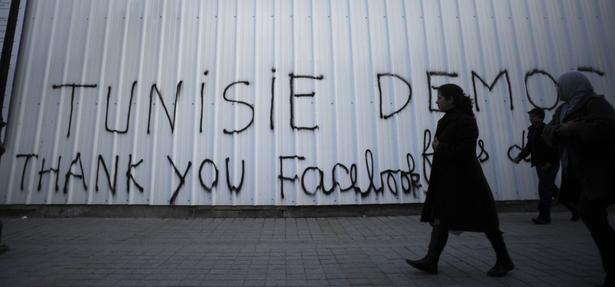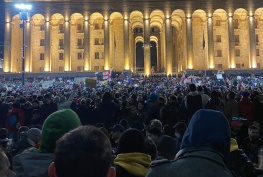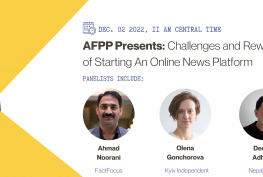By Daniel Pearl Fellow Asma Ghribi
Many people said that the Tunisian uprising was the first “Facebook revolution.”
That may be an overstatement. But social media – first and foremost Facebook, as Twitter use is less widespread in Tunisia – unquestionably played an important role in empowering the 2011 uprising which overthrew the ruling Ben Ali regime. It continues to influence the social, political, and media development of the country.
Before 2011, the regime’s ability to control media was an essential tool for maintaining control over the country. The 2011 uprising was not the first attempt to challenge the authority of the regime. The first serious attempt to challenge the authority of the regime was in 2008, in the marginalized mining region of Gafsa.
That uprising failed, in my view, because the story didn’t manage to leave Gafsa.
Unless you were a well-connected political activist, you didn’t know anything was going on. If you relied on the traditional media, you would only get the regime’s version of events, which was distorted.
But in 2011, I knew Mohammed Bouazizi burned himself on December 18 because I saw it on Facebook. That’s also how the information in 2011 made it to the world.
The whole world heard of the Tunisian revolt, sparked by the street fruit vendor’s self immolation and supported by hundred of thousands of Tunisian young people who grew frustrated by the lack, not to say the absence, of freedom and social justice.
Major media such as France 24 and Al Jazeera shared videos posted on social networks in Tunisia. This garnered the support from sympathetic populations, weakened Ben Ali’s standing, and eventually allowed the spirit of revolution to spread to other countries.
While much has been written about the role social networks played in the uprising, much less has been said about how it continues to influence media and politics in my country.
One of the things that’s more or less unique to Tunisia (or at least different from the U.S.) is that for a journalist such as myself, Facebook is essential to newsgathering.
Government and other institutions in the United States and other countries deliver press releases and other statements directly to media outlets. In Tunisia Facebook is literally the first place news is broken – by important state authorities such as the Interior Ministry and the Constituent Assembly, but also by non-state actors such as controversial religious groups. Ansar Al-Sharia, a group categorized by the U.S. government as a terrorist organization, uses Facebook to share important announcements.
For example, the then Interior Minister Ali Laarayedh resorted to making his own videos to give his version of certain controversial events, perhaps in an effort to avoid going through Tunisian media outlets.
For non-journalists as well, Facebook is an essential tool for consuming and disseminating information. Polls have shown that media outlets in Tunisia are generally distrusted by the population.
Facebook provides a public forum for citizens to critique the information that is provided by professional media organizations. It also allows them to bypass these outlets entirely, spreading their own information — for better or for worse.
Sometimes, this amplifies rumors to the extent that in chaotic situations (which are frequent) it becomes hard to distinguish fact from fiction.
Facebook in Tunisia is more than that a venture created by two Harvard students created to facilitate communication between their peers and provide them with a platform to share and brag about their musical tastes.
It is an alternative means of communication – for journalists, state institutions, and citizens of all types.





